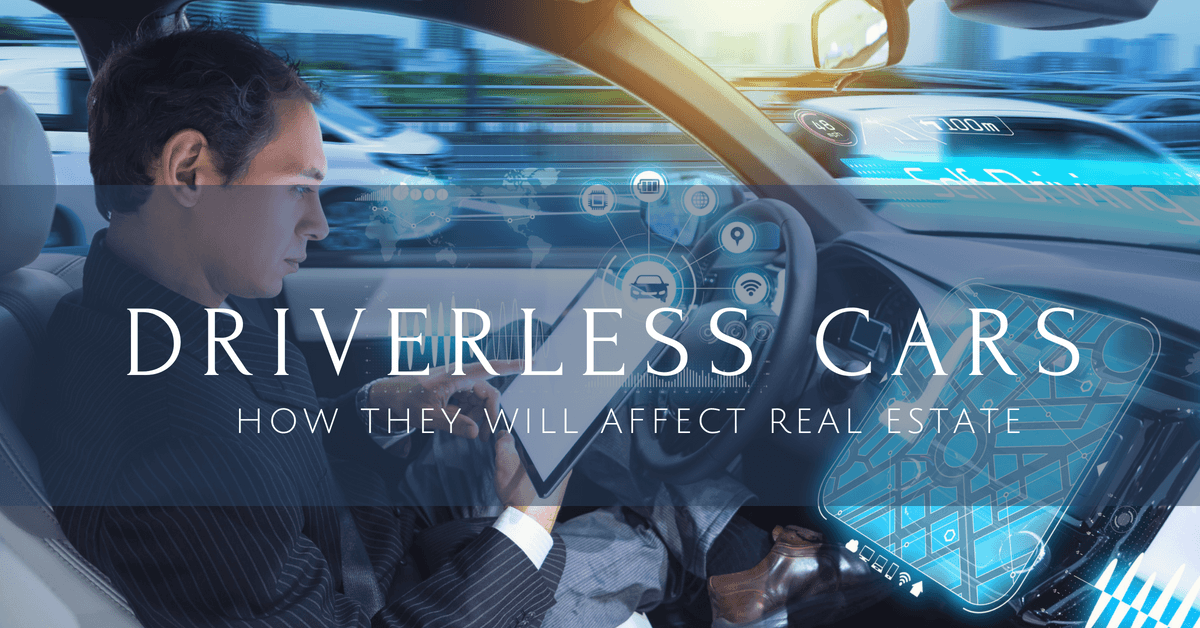How Driverless Cars Will Affect Real Estate
There is a lot of hype surrounding driverless cars. With the 263 million traditional cars currently clogging our country’s roads and two billion parking spaces as reported by Curbed.com, any major transportation shift is going to require a huge change in future real estate development. While this cultural shift will likely change the way people get from one place to another, the implications for the real estate industry are already being considered by developers and other real estate speculators as they prepare for massive infrastructure changes to prepare for the arrival of automated vehicles.
There is certainly no doubt that the “highest and best” use of land will change when cars no longer sit idle about 95 percent of the time, according to Bloomberg.com. Currently, vehicles are stored for hours in parking lots and garages that occupy prime real estate that could be repurposed and eventually sold by a worthy Realtor to a hungry buyer seeking intown property. With that much real estate and money at stake, the speculators and opportunists will be planning strategies about how to profit from the upcoming transformation related to automated vehicles.
Timeline Projections
There is a lot of speculation about exactly when driverless cars will be available for purchase and when they will actually start impacting society in a real way. There are different opinions about the timeframe related to driverless cars and when they will truly become a force shaping real estate development and society. CNBC projects that driverless cars could become a reality in five years, impacting the real estate market in a meaningful way as soon as eight or nine years. Ford expects to have driverless cars ready to sell in 2021.
Factors that must be taken into account when considering timeline projections relate to preparation for a society where driverless cars are the norm. Some experts say that infrastructure changes required for the arrival of these cars include: improved signage and zoning changes. Current signs may not be easily seen by automated drivers and this will have to change to ensure safety.
Residential Development
When it’s time to buy a home, a quality real estate agent will be key to find your dream home of the future. Since the commute of the future will be less taxing, with riders able to work on the way and enjoy the trip more, commute time will be less of an issue. Developers armed with the newest real estate technology and lower costs will be able to build homes at a lower cost per square foot, with smaller garages.
Repurposing Parking Lots and Garages
A major development associated with this major shift to automated cars will be a lot of excess parking and garage spaces. The assumption is that most drivers will jump on the ride-sharing bandwagon to meet transportation needs which will free up parking lots and garages to a large extent. Considering the massive amount of square footage that is tied up in car storage and parking, developers are thinking about ways to repurpose all of that space.
Many home garages are expected to be turned into living space. Parking garages located in high-density urban areas can be changed into more homes in areas that desperately need more housing. Real estate speculators are preparing to take advantage this shift.
Senior Living Real Estate Changes
One obvious benefit of this futuristic society where cars drive passengers around instead of relying on drivers to do the work is that seniors will be able to stay in their homes longer. The senior community wants to be independent as long as possible. The surge of assisted living facilities may stop growing as mixed use communities and driverless cars make it much easier for elderly citizens unable to continue driving to remain on their own.
Industrial Real Estate
Automated cars completely change the face of industrial land usage. Logistics will change forever now that truck drivers and other delivery personnel are no longer needed. Expensive warehouse space that was once located in strategic areas near the drivers can be moved to cheaper and more remote spaces.
Many of the businesses that cater to truckers will be impacted negatively. Much like the retail business that is facing disaster due to online shopping, these roadside stops that feed and provide for the trucking industry will also be impacted as the need for their services is decreased. This industrial real estate will likely be sold and rezoned to match a new landscape.
Preparing for the Real Estate Shift Associated with Automated Transportation
Architectural companies are already planning for this epic transportation shift. CNBC reports that architect Andy Cohen is already designing garages with horizontal floors and an exterior ramp instead of slanted floors. This design modification allows these structures more flexibility so they can be easily converted to office space in the future as the driverless cars take hold.
Other architects like Andy Cohen will be pushed by consumers who will expect smaller garages to maximize the square footage of the home. The day of the three car garage will most likely come to an end, as driverless cars will make driving your own car more of a luxury than a necessity.
The future of the automated car looks bright but is not without considerable challenges as engineers, city planners and real estate developers try to figure out how best to proceed with what seems inevitable. Real estate firms with the latest real estate technology and an eye to the future are likely to start negotiating fewer parking spaces when planning new building projects. They are likely to rely on contracts with companies like Uber and Lyft as a logical move into the future and to satisfy commuters’ needs. The main debate left to be argued about this new driverless future is exactly how fast all of these changes will take place.
Continue reading about real estate and technology with our article on Virtual Reality and the real estate industry.









